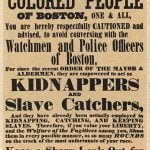
The Fugitive Slave Law was enacted by Congress in September, 1850, received the signature of Howell Cobb, of Georgia, as Speaker of the House of Representatives, of William R. King, of Alabama, as President of the Senate, and was “approved,” September 18th, of that year, by Millard Fillmore, Acting President of the United States.
The authorship of the Bill is generally ascribed to James M. Mason, Senator from Virginia. Before proceeding to the principal object of this tract, it is proper to give a synopsis of the Act itself, which was well called, by the New York Evening Post, “An Act for the Encouragement of Kidnapping.”
The Fugitive Slave Law TOC
- Synopsis of the Law
- Northern Men Voting Against Law
- Victims of the Fugitive Slave Law
- Present Record of Fugitive Slave Law
Names mentioned in work:
Adam Gibson
Amanda
Anthony Burns
Basil White
Bill, or William Thomas
Celeste
Charles Wedley
Christiana
Daniel ??
Daniel Hawkins
Daughter of Samuel Godshall
Dick
Edward Davis
Elizabeth Williams
Euphemia Williams or Mrs. Tamor
Fanny
Frank Jackson
George
George Clark
George Mitchell
George W. McQuerry
Harvey
Helen or Hannah
Henry
Henry Garnett
Henry Long
Henry Massey
Horace Preston
Jack
Jacob Green
James Cotes
James Hamlet
James Phillips
James Tasker
Jane Johnson
Jane Moore
Jane Trainer
Jerry
John Bolding
John Freeman
John Henry Wilson
Joshua Glover
Louisa
Mitchum
Moses Johnson
Passmore Williamson
Patrick Sneed
Rachel Parker
Ralls and Logan
Richard Gardiner
Richard Neal
Rosetta Armstead
Shadrach
Stephen Bennett
Stephen Pembroke
The Lemmon Slaves
Thomas Brown
Thomas Hall
Thomas Scott Johnson
Thomas Sims
William and Ellen Craft
William Smith
